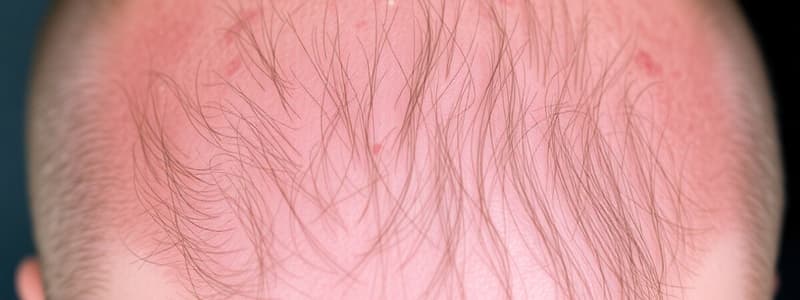Podcast
Questions and Answers
¿Qué tipo de condiciones médicas pueden contribuir a problemas en el cuero cabelludo?
¿Qué tipo de condiciones médicas pueden contribuir a problemas en el cuero cabelludo?
- Enfermedades autoinmunes como el lupus (correct)
- Infecciones bacterianas simples
- Deshidratación leve
- Solo condiciones relacionadas con la piel
¿Cuál es una intervención recomendada para el tratamiento de problemas en el cuero cabelludo?
¿Cuál es una intervención recomendada para el tratamiento de problemas en el cuero cabelludo?
- Automedicarse con medicinas de venta libre
- No realizar un seguimiento regular
- Consultar con un dermatólogo o tricólogo (correct)
- Usar siempre champús agresivos
¿Cuáles de los siguientes factores ambientales pueden provocar reacciones en el cuero cabelludo?
¿Cuáles de los siguientes factores ambientales pueden provocar reacciones en el cuero cabelludo?
- Bajo consumo de agua
- Solo el uso de productos para el cabello
- Cambios de temperatura en interiores
- La exposición a alérgenos como químicos o polvo (correct)
¿Cuál es un aspecto importante en el diagnóstico de problemas del cuero cabelludo?
¿Cuál es un aspecto importante en el diagnóstico de problemas del cuero cabelludo?
¿Qué prácticas de manejo y prevención son recomendadas para mantener la salud del cuero cabelludo?
¿Qué prácticas de manejo y prevención son recomendadas para mantener la salud del cuero cabelludo?
¿Cuál de las siguientes condiciones se caracteriza por la pérdida de cabello en parches de forma repentina?
¿Cuál de las siguientes condiciones se caracteriza por la pérdida de cabello en parches de forma repentina?
¿Qué síntoma es común en la psoriasis del cuero cabelludo?
¿Qué síntoma es común en la psoriasis del cuero cabelludo?
¿Cuál de las siguientes afirmaciones sobre las infecciones fúngicas del cuero cabelludo es correcta?
¿Cuál de las siguientes afirmaciones sobre las infecciones fúngicas del cuero cabelludo es correcta?
¿Cuáles son factores que pueden influir en la salud del cuero cabelludo?
¿Cuáles son factores que pueden influir en la salud del cuero cabelludo?
¿Qué condición es caracterizada por piel seca, inflamada y con picazón en el cuero cabelludo?
¿Qué condición es caracterizada por piel seca, inflamada y con picazón en el cuero cabelludo?
¿Qué tipo de dermatitis se asocia con piel grasa y sobrecrecimiento de levaduras?
¿Qué tipo de dermatitis se asocia con piel grasa y sobrecrecimiento de levaduras?
¿Cuál de los siguientes no es un síntoma común de foliculitis?
¿Cuál de los siguientes no es un síntoma común de foliculitis?
¿Qué factor puede desencadenar o agravar las condiciones del cuero cabelludo como la dermatitis seborreica?
¿Qué factor puede desencadenar o agravar las condiciones del cuero cabelludo como la dermatitis seborreica?
Flashcards
Medicamentos y Cuero Cabelludo
Medicamentos y Cuero Cabelludo
Ciertos medicamentos, como algunos antibióticos y agentes de quimioterapia, pueden inducir o agravar problemas en el cuero cabelludo.
Factores Ambientales y Cuero Cabelludo
Factores Ambientales y Cuero Cabelludo
La exposición a alérgenos, como ciertos químicos o incluso polvo, frío o viento, puede provocar inflamación y reacciones cutáneas en el cuero cabelludo.
Diagnóstico de Problemas del Cuero Cabelludo
Diagnóstico de Problemas del Cuero Cabelludo
El diagnóstico a menudo implica un examen físico por un dermatólogo o un tricólogo (especialista en cabello).
Opciones de Tratamiento para el Cuero Cabelludo
Opciones de Tratamiento para el Cuero Cabelludo
Signup and view all the flashcards
Manejo y Prevención de Problemas del Cuero Cabelludo
Manejo y Prevención de Problemas del Cuero Cabelludo
Signup and view all the flashcards
Dermatitis seborreica
Dermatitis seborreica
Signup and view all the flashcards
Psoriasis
Psoriasis
Signup and view all the flashcards
Infecciones fúngicas (Tinea capitis)
Infecciones fúngicas (Tinea capitis)
Signup and view all the flashcards
Alopecia areata
Alopecia areata
Signup and view all the flashcards
Foliculitis
Foliculitis
Signup and view all the flashcards
Eczema (Dermatitis atópica)
Eczema (Dermatitis atópica)
Signup and view all the flashcards
Liquen plano pilar
Liquen plano pilar
Signup and view all the flashcards
Cambios hormonales como factor contribuyente a las enfermedades del cuero cabelludo
Cambios hormonales como factor contribuyente a las enfermedades del cuero cabelludo
Signup and view all the flashcards
Study Notes
General Overview of Scalp Diseases
- Scalp diseases encompass a wide range of conditions affecting the skin and tissues of the scalp.
- These conditions can manifest as varied symptoms, from mild irritation to severe inflammation and/or hair loss.
- Diagnosis and treatment rely on identifying the underlying cause.
- Common factors influencing scalp health include genetics, environmental factors, and underlying medical conditions.
Common Types of Scalp Diseases
- Seborrheic Dermatitis: A common inflammatory skin condition characterized by red, flaky patches on the scalp, face, or other body areas.
- Often associated with oily skin and/or yeast overgrowth.
- Symptoms may include itching, scaling, and sometimes dandruff.
- Psoriasis: A chronic autoimmune disorder causing skin cells to multiply rapidly, leading to raised, red, scaly patches.
- Scalp psoriasis manifests similarly to other body parts, with noticeable scaling and itching.
- Often accompanied by joint inflammation (psoriatic arthritis).
- Fungal Infections (Tinea Capitis): Fungal infections presenting as patchy hair loss or circular scaling.
- Can lead to inflammation and itching.
- Typically treated with antifungal medications.
- Alopecia Areata: An autoimmune condition characterized by sudden, spotty hair loss, potentially leading to complete baldness in affected areas.
- Its cause is unknown, though stress and other factors may trigger outbreaks.
- Folliculitis: Inflammation of the hair follicles, appearing as small bumps and/or pustules.
- Can result from bacteria, fungi, or certain medications.
- Symptoms may include itching, pain, and redness.
- Eczema (Atopic Dermatitis): A chronic inflammatory skin condition affecting the scalp.
- Characterized by dry, itchy, and inflamed skin.
- May be linked to allergies or other environmental factors.
- Lichen Planopilaris: Inflammatory skin disorder marked by hair loss, itching, and inflammation that progresses to scarring.
- Often presents as small, reddish bumps.
Contributing Factors to Scalp Diseases
- Hormonal Changes: Fluctuations in hormones sometimes trigger or worsen conditions like seborrheic dermatitis.
- Stress: Psychological stress potentially contributes to the development or worsening of certain scalp conditions.
- Medications: Some medications, including antibiotics and chemotherapy drugs, can cause or exacerbate scalp problems.
- Environmental Factors: Exposure to allergens (chemicals, dust, cold, or wind) can provoke inflammation and skin reactions.
- Underlying Medical Conditions: Systemic illnesses like lupus or thyroid disorders can contribute to scalp issues.
Diagnosis and Treatment
- Diagnosis frequently involves a physical examination by a dermatologist or trichologist (hair specialist).
- Detailed patient history and assessments, including symptom triggers and medical history, are crucial.
- Treatment options vary by diagnosis, encompassing topical medications (creams, ointments, shampoos), oral medications, topical steroids, or more intensive interventions.
- Lifestyle changes (stress management, dietary adjustments) might aid treatment.
- Regular scalp health monitoring is vital for successful treatment, especially for chronic conditions.
- Self-treatment without professional guidance is generally discouraged, as some conditions can be serious.
Management and Prevention
- Keep the scalp clean and dry; avoid harsh shampoos.
- Identify and manage contributing factors (e.g., stress management).
- Regular follow-up appointments with a healthcare professional are essential, especially for chronic conditions.
- Customized skincare routines for scalp needs are beneficial.
- Consult a dermatologist or trichologist regularly to prevent severe scalp disease outcomes.
Studying That Suits You
Use AI to generate personalized quizzes and flashcards to suit your learning preferences.



